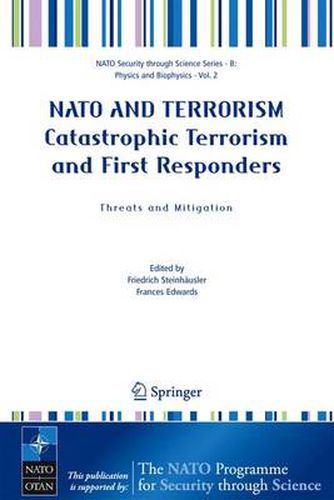Readings Newsletter
Become a Readings Member to make your shopping experience even easier.
Sign in or sign up for free!
You’re not far away from qualifying for FREE standard shipping within Australia
You’ve qualified for FREE standard shipping within Australia
The cart is loading…






This title is printed to order. This book may have been self-published. If so, we cannot guarantee the quality of the content. In the main most books will have gone through the editing process however some may not. We therefore suggest that you be aware of this before ordering this book. If in doubt check either the author or publisher’s details as we are unable to accept any returns unless they are faulty. Please contact us if you have any questions.
September 11, 2001 in the U.S., March 11, 2004 in Madrid - just two examples of a series of major terror attacks against NATO member states on both sides of the Atlantic. We now know that international terrorism is capable of transboundary planning and military style execution of attacks, resulting in several thousand dead and wounded. In the future even larger terror attacks can no longer be ruled out, including the deployment of weapons of mass destruction. This new form of catastrophic terrorism poses a major challenge to the first responder community in their search and rescue operations, since these new threats represent an unprecedented risk for their health, possibly even questioning their own survival. Since the first responders are the first line of defence of every community in the aftermath of such a terror attack, it is essential for every community to ensure that its first responders are able to provide their valuable services even in such extreme situations.
In this important new book a group of experts represents the current knowledge on the various terrorism threats to first responders resulting from the novel use of conventional weapons, as well radiological, nuclear, biological and chemical weapons. Also, the current situation in selected countries of different sizes and practical experience with terrorism countermeasures (Austria, Israel, Slovenia, Russia, U.S.) is reviewed, focusing on the national operational logistics and the individual needs for improving the present situation. Finally, this book offers innovative solutions to strengthen the level of protection of the first responders, culminating in fifty-one practically applicable recommendations.
$9.00 standard shipping within Australia
FREE standard shipping within Australia for orders over $100.00
Express & International shipping calculated at checkout
This title is printed to order. This book may have been self-published. If so, we cannot guarantee the quality of the content. In the main most books will have gone through the editing process however some may not. We therefore suggest that you be aware of this before ordering this book. If in doubt check either the author or publisher’s details as we are unable to accept any returns unless they are faulty. Please contact us if you have any questions.
September 11, 2001 in the U.S., March 11, 2004 in Madrid - just two examples of a series of major terror attacks against NATO member states on both sides of the Atlantic. We now know that international terrorism is capable of transboundary planning and military style execution of attacks, resulting in several thousand dead and wounded. In the future even larger terror attacks can no longer be ruled out, including the deployment of weapons of mass destruction. This new form of catastrophic terrorism poses a major challenge to the first responder community in their search and rescue operations, since these new threats represent an unprecedented risk for their health, possibly even questioning their own survival. Since the first responders are the first line of defence of every community in the aftermath of such a terror attack, it is essential for every community to ensure that its first responders are able to provide their valuable services even in such extreme situations.
In this important new book a group of experts represents the current knowledge on the various terrorism threats to first responders resulting from the novel use of conventional weapons, as well radiological, nuclear, biological and chemical weapons. Also, the current situation in selected countries of different sizes and practical experience with terrorism countermeasures (Austria, Israel, Slovenia, Russia, U.S.) is reviewed, focusing on the national operational logistics and the individual needs for improving the present situation. Finally, this book offers innovative solutions to strengthen the level of protection of the first responders, culminating in fifty-one practically applicable recommendations.